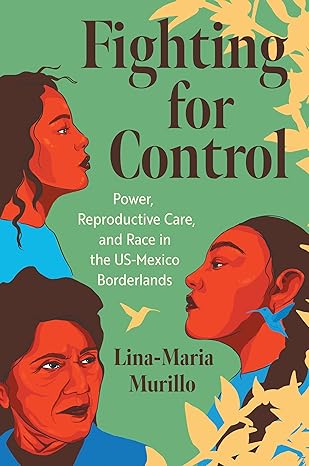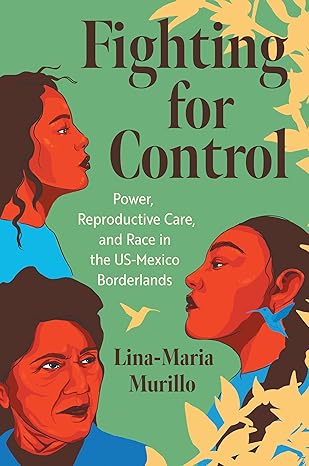
The Book
Fighting for Control: Power, Reproductive Care, and Race in the US-Mexico Borderlands
The Author(s)
Lina-Maria Murillo

Powerfully written and rigorously researched, Fighting for Control: Power, Reproductive Care, and Race in the US-Mexico Borderlands, offers readers a historical analysis of birth control layered upon compelling theoretical insights that expand our understanding of population control, reproductive oppression and struggles for bodily autonomy in the United States. In this fascinating history, Lina-Maria Murillo embraces a reproductive justice framework, decentering movements for legal rights to contraception or abortion, and focusing instead on the dynamics of power that informed the ideologies and actions of the book’s multiple stakeholders, including white birth control activists, the Catholic Church, Mexican-origin women and Chicanas, and Mexican capitalists. As the first historical analysis of reproductive control and justice in the borderlands from the mid-19th century to the 1980s, Fighting for Control shifts how we understand, study and intervene in the politics of reproduction.
Murillo begins by documenting a longstanding and deep-seated population control ideology that both motivated and rationalized racist birth control campaigns. Chapter one details the history of violent immigration and eugenics projects that established the borderlands as “ground zero for the battle against racial decay of the white American nation“.[1] This history sets the stage for chapter two, which examines what Murillo calls the “worldmaking” of birth control advocates in El Paso and the promulgation of contraception as a necessary tool in their population control efforts. Indeed, Murillo illustrates how advocates like Margaret Sanger and Betty Mary Goetting tied the poverty and inequality that Mexican-origin communities faced to their reproduction, even in the face of criticism by community members and the Catholic church who, instead, highlighted the reality of low wages, social marginalization and overall economic exploitation. Their success was marked by the establishment of the first birth control clinic in El Paso in the 1930s. Together, the chapters elaborate two central themes of the book–the racialization of Mexican-origin women’s reproduction as a threat requiring intervention, and how “Sangsters” pushed contraception as a population control method to maintain white social, political and economic power along the US-Mexico border.[2]
Chapters three through six build on the themes in the preceding chapters while introducing and applying Murillo’s main theoretical contribution, the concept of reproductive care; “the sometimes radical, sometimes conventional everyday actions of racialized, minoritized, and marginalized community members to comfort, support and uplift each other amid the confines of state and nonstate suppression, surveillance, and capitalist exploitation.”[3] Combining oral histories, data from Planned Parenthood of El Paso (chapter three), and research on birth control trials involving women in the borderlands (chapter four), Murillo shows how Mexican-origin women creatively navigated the “rhetorical and material minefields” of birth controllers, asserting the needs of themselves and their communities.[4] Centering the work of Chicana activist Amelia Castillo in chapter five, Murillo documents the establishment of the first Chicano-run health clinic in the borderlands— the Father Rahm Clinic. Her analysis positions Chicana health activism, specifically, the demand for broad-based community health resources alongside contraceptives and abortion services, as a stark contrast to and antidote for population control ideology. Murillo’s final chapter applies a reproductive lens to well-established analyses of racialized and gendered labor in the maquiladora industry along the border during the 1970s and 80s. Here, Murillo situates the multiple family planning clinics established by Guadalupe Arizpe de la Vega in Northern Mexico as part of an evolving international population control network embroiled in the maquiladora industry’s need for cheap, exploitable, feminized labor. At the same time, Murillo asserts that Mexican-origin women on both sides of the border accessed contraceptive and reproductive health services at the clinics as a means of asserting control over their lives. With these chapters, Murillo thoroughly debunks the demeaning stereotype of Mexican-origin women as either opposed to or disinterested in contraception and abortion.
A hallmark of Murillo’s book is her insistence on detailing the reproductive violence of population control ideology in the borderlands while also highlighting Mexican-origin women’s longstanding resolve to achieve reproductive autonomy. Murillo’s theorizing of reproductive care, which draws on theories of racial capitalism, social reproduction theory, theories of care, and Chicana and U.S. Third World feminisms, situates Mexican-origin women’s individual, collective, and day-to-day actions as more than a response to reproductive oppression. Read through her theory of reproductive care, these efforts represent a potent oppositional form of labor power that redirects care “among marginalized communities for their human benefit and survival” in a context of capitalist labor extraction.[5] Thus, not only does Fighting for Control offer a multifaceted historical analysis, but it also presents readers with crucial insight into the labor and praxis that makes reproductive freedom possible.
[1] Lina-Maria Murillo, Fighting for Control?: Power, Reproductive Care, and Race in the US-Mexico Borderlands, Justice, Power, and Politics (Chapel Hill: The University of North Carolina Press, 2025), 26.
[2] Murillo, 77.
[3] Murillo, 93.
[4] Murillo, 116.
[5] Murillo, 96.
About the Reviewer
Natalie Lira is an interdisciplinary scholar who examines the politics of reproduction and histories of medicine in the United States. She is currently Associate Professor in the Department of Latina/Latino Studies at the University of Illinois at Champaign Urbana. Dr. Lira is also the co-director of the Sterilization and Social Justice Lab (SSJL)–a multi-institutional interdisciplinary research team studies the history of eugenic sterilization in the United States.




